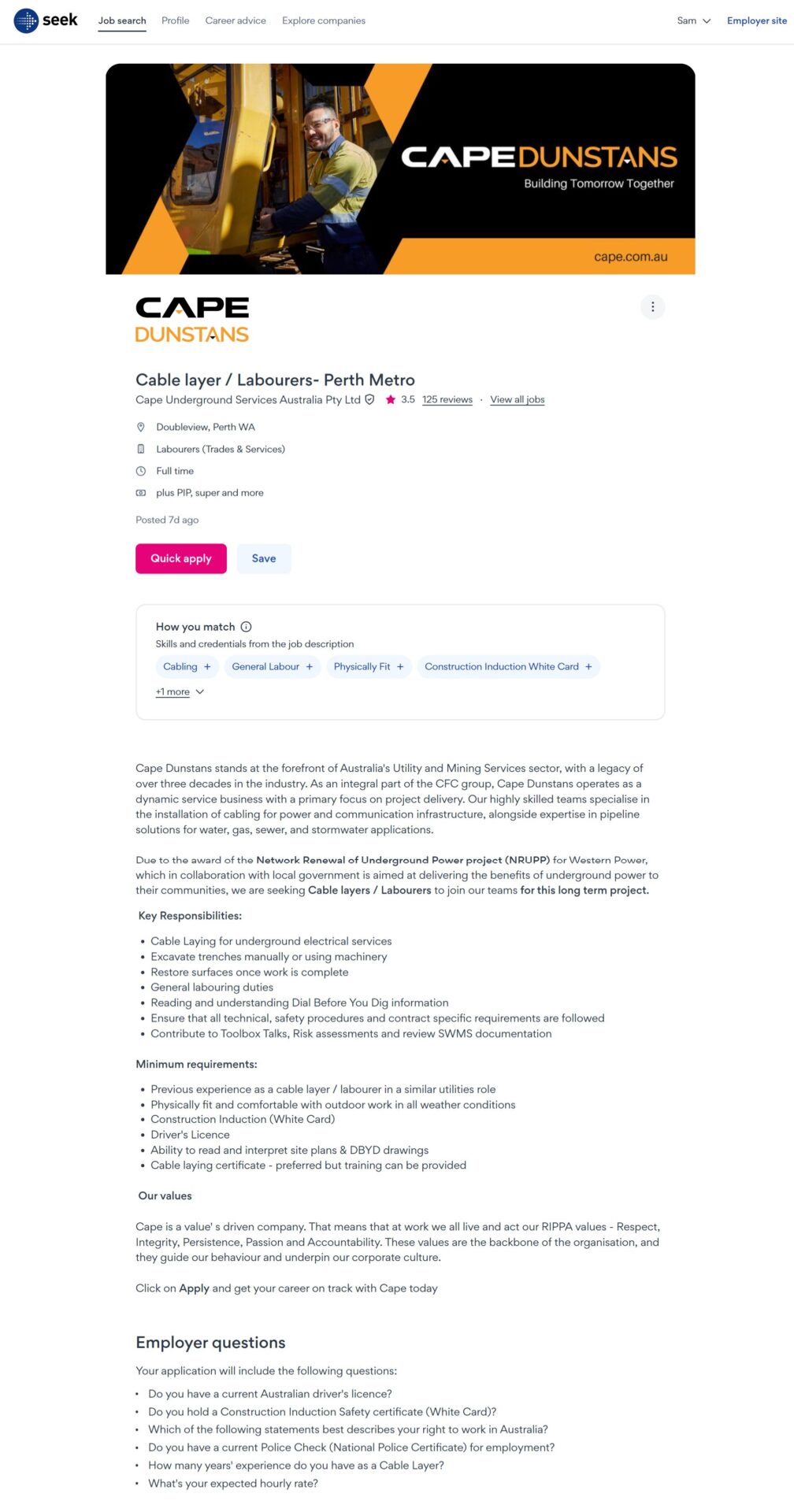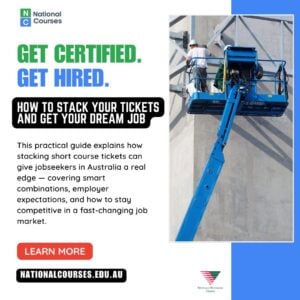How to Get a Job in Mining and Civil Construction in Australia: Detailed Guide
Key Takeaways
- Your Experience Counts: Skills from other industries — like hospitality, sport, or retail — are valuable in construction and mining roles.
- Get Certified, Get Noticed: Short courses like White Card, First Aid, or Working at Heights can help you stand out and show you're serious.
- Resumes Need Strategy: Tailor your resume with keywords from the job ad and keep formatting simple for ATS systems to read.
- Applications Aren’t Enough: Google the company, make contact, ask questions — most people won’t, and that’s your edge.
- Employers Want the Basics: Reliability, safety awareness, and a willingness to learn will get you further than experience alone.
- Learn from Others’ Mistakes: Avoid generic resumes, poor preparation, and giving up too early — it’s a competitive game.
- Training That Gets Results: National Courses helps people get certified and hired through expert training and real success stories.
Australian Mining and Civil Construction Jobs in 2025
Mining, resources, and civil construction jobs are known for one thing: big pay packets.
But here’s the truth — most people applying for jobs in mining and civil construction in Australia don’t make it past the first hurdle.
They’re keen for the experience and paycheck, but unprepared for the work that's actually involved to get hired.
This guide walks you through exactly what to do, step-by-step.
No fluff — just the practical insights you actually need to stand out and land that dream job.

Understand the Job First

It’s tempting to glance at a job ad and hit “Apply” right away.
But that’s a mistake that could cost you the opportunity.
These roles are highly competitive, and hiring managers can easily spot lazy applications.
They’re looking for candidates who put in the effort to truly understand the job.
Here’s how to stand out:
Analyze and Break Down the Job Ad
Don’t just scan for the obvious.
Take the time to break the ad down into key components.
Understand exactly what the employer is looking for.
- Responsibilities: What are your day-to-day tasks? Get a clear idea of what’s expected of you on a daily basis.
- Core Duties: Will you be operating machinery, doing manual labor, or handling reports? Make sure you know exactly what’s involved.
- Working Environment: Is the role FIFO (fly-in, fly-out)? Does it involve shift work, remote locations, or tough conditions? This will impact your lifestyle and commitment.
Pro Tip: Don’t just rely on one job ad. Look at five or more listings for the same role. By comparing them, you’ll start seeing common threads and patterns — the skills and qualities that employers in that industry truly value.
What Are the Core Skills?
You Probably Have More Experience and Core Skills Than You Think

Think your past jobs don’t apply? Think again.
Whether you’ve worked in a warehouse, behind a bar, or on a shovel — you’ve gained valuable skills that can carry over into mining and civil construction.
You just need to position them correctly.
- Warehouse / Inventory Roles: Logistics awareness, tool use, forklift or machinery handling.
- Labouring: Physical stamina, adaptability, and familiarity with worksite expectations.
- Hospitality or Retail: Working under pressure, teamwork, communication, reliability.
- Team Sports or Group Projects: Leadership, accountability, and collaboration.
Hard Skills vs. Soft Skills
In civil and mining, both are essential — but most people only list the hard stuff.
Don’t make that mistake.
- Hard skills: Technical abilities like operating equipment, performing first aid, or following safety protocols.
- Soft skills: Attitude, problem-solving, punctuality, work ethic, communication, and team dynamics.
Here’s the truth: most employers in this industry will train you on the technical stuff — as long as you show the right mindset and work ethic.
But if your resume doesn’t clearly show that you’re reliable, enthusiastic, and ready to learn, you’re unlikely to even get a call back.
Certifications: What You Need & Why They Matter
Know What’s Required (and What’s a Bonus)

If you're serious about breaking into construction, mining or trades, there’s no way around it — you need the right certifications.
They’re not just paperwork. They’re proof that you’re trained, ready and safe to put on site.
Some are absolutely essential.
Others can push your resume to the top of the stack.
And the more you’ve got under your belt, the less risk you are to employers — which means more interviews, more job offers, and better pay.
Certs That Are Often Mandatory
- White Card: Required by law for anyone working on a construction site in Australia.
- First Aid & CPR: Required or preferred for most high-risk worksites — shows you can respond in an emergency.
- Working at Heights: Vital for roles involving ladders, scaffolds, roofs, or EWP work — especially in civil and resources.
- Confined Spaces: Required if you’re entering pits, tanks, shafts or similar — common in mining, maintenance, and utilities.
Extra Tickets That Set You Apart
Beyond the basics, getting additional high-demand certs gives you an edge.
Think mobile plant training (like haul trucks and excavators), fire safety, traffic control, or scaffolding — even having one extra qualification can make the difference when two resumes land on a desk.
Why It’s Worth the Investment
Yes, you’ might have to spend a few hundred bucks. But here’s what most people don’t realise:
Hiring managers are under pressure to fill roles fast.
If you’ve already got the required certs, they don’t have to wait around for you to complete training — you can start right away.
That means less competition, more job offers, and a shorter path to your first pay cheque. And once you’re in the door, the experience you gain multiplies your future options.
Most people wait until they “get a job” to get certified.
Smart people do it the other way around.
Be ready before the opportunity knocks. It’ll make all the difference.
What Most People Get Wrong About Resumes
Be Truthful — But Strategic

Let’s be real — hiring managers don’t read every word.
They scan. Fast. That means your resume needs to be laser-focused and easy to digest.
Forget the fluff.
Your resume isn’t a life story — it’s a highlight reel.
Show them, in under 30 seconds, why you’re a safe, reliable, job-ready candidate worth calling.
What to Cut — and What to Keep
- Cut: Old, irrelevant jobs (e.g. Coles supermarket attendant in 2013) unless they clearly show transferable skills.
- Keep: Anything that demonstrates work ethic, teamwork, safety awareness, or experience in tough conditions — even if it wasn’t a formal role.
Mirror the Job Ad (But Keep It Natural)
Recruiters are often looking for keywords that match the job ad — especially in bigger companies that use automated screening tools. But don’t overdo it.
If the ad says “able to work independently in remote areas,” and that’s something you’ve done, use similar phrasing — just make sure it’s true and written in your own voice.
Make It Easy to Read
Nothing gets skipped faster than a messy wall of text.
Keep your layout clean and simple:
- Use clear section headings (e.g. Work History, Tickets & Licences, References)
- Write in bullet points, not paragraphs
- Stick to one page if you’re just starting out
- Highlight your most recent or most relevant experience first
Pro tip: If your resume is hard to read on a phone, it’s too crowded. Keep it tight, relevant, and easy on the eyes.
Remember — your resume won’t get you the job on its own. But it should get you in the room.
The Harsh Truth: Employers Are Flooded With Applicants
Your Resume Might Never Be Seen by a Human

How to Beat the Resume Robots (AKA ATS)
Most employers now use Applicant Tracking Systems (ATS) — software that scans your resume before a human ever sees it.
If your resume isn’t ATS-friendly, it could get rejected automatically, no matter how qualified you are.
Here’s how to stay in the game:
- Use keywords from the job ad: Match the language of the job description (e.g. “manual handling,” “remote work,” “construction labourer”). If it’s mentioned more than once, it’s probably important.
- Keep formatting clean: Avoid tables, columns, headers/footers, or graphics. Stick to simple fonts like Arial, Calibri, or Poppins.
- Don’t get fancy: No photos, logos, or icons — ATS software can’t read them and may discard your resume.
- Save it right: Use PDF format unless the job ad specifically asks for Word or another format.
Pro tip: If in doubt, use a plain text resume layout. It might look basic, but it plays nicely with ATS software — which means your resume actually gets seen.
Getting Seen Means Doing More Than Applying Online
Don't Just Sit Around and Wait for a Reply

Job boards are crowded — and most applications blur together.
If you already know the company name, don’t just wait around. Google them.
Head straight to their careers page or get their contact details.
Go beyond “Apply Now.”
Take It to the Next Level
- Call and introduce yourself: Let them know you’re interested and ask if they’re still hiring.
- Visit in person (if local): A quick, polite visit can leave a lasting impression — especially for hands-on roles.
- Ask smart questions: Show you’ve done your homework and care about the role and the company.
This kind of initiative is rare these days — and that’s exactly why it works.
It is certainly appreciated by employers in these highly competitive industries and you will make a positive first impression.
Always Follow Up
A short, professional follow-up call or email a few days after applying can push your name to the top of the list.
Stay polite, be clear, and don’t be afraid to show you’re keen.
How to Be the Ideal Candidate
Don’t Fake It — Become It

Employers don’t expect you to walk in with years of experience — but they are looking for people who are reliable, safety-conscious, and eager to learn.
Upskill With Purpose
Even short, low-cost courses can give you a serious edge.
Haven’t worked in mining or construction before? That’s fine.
Completing industry-recognised training like:
- White Card (mandatory for construction sites)
- First Aid + CPR
- Working at Heights
It tells employers you’re ready to hit the ground running. It shows initiative, commitment, and a basic understanding of worksite safety.
What Employers Really Look For
- Reliability: Show up, do the work, stay consistent.
- Safety mindset: Understand the risks and follow procedures.
- Positive attitude: Be coachable, respectful, and proactive.
- Work ethic: Show that you’re willing to put in the effort.
If you bring those traits, you’re already ahead of most applicants — even the more experienced ones.
Common Mistakes That Waste Time
Most people unknowingly sabotage their own job hunt.
Here’s what to avoid:
- Spray-and-pray resumes: Sending the same generic resume to every job without tailoring it to the role.
- Missing required certs: Applying without essentials like a White Card or First Aid shows you haven’t done the groundwork.
- Zero research: Not understanding the company, job requirements, or site conditions (especially for FIFO roles).
- Being unprepared for the reality: Remote work, tough conditions, early starts — they’re part of the job. Don’t be surprised.
- Quitting too early: Rejection is normal. Learn, adapt, and try again. Persistence wins.
Avoid these traps, and you’ll immediately stand out in the mining and civil construction job market.
Final Advice: You Can Get the Job
But You Have to Work for It

Getting into mining or civil construction isn’t about luck.
It’s about preparation and persistence.
Do the extra research. Get the right certifications. Tailor your resume for each application.
These are the steps that separate the serious candidates from the rest.
Most people won’t go the extra mile.
They’ll skip the research, send out generic applications, and hope for the best.
The effort you put in now will set you apart from the competition — and you’ll be surprised how quickly doors open.
Don’t wait for opportunities to find you. Create them.
If you’re serious about landing a high-paying job in mining or construction, it starts with the steps outlined here.
Invest in yourself, stay persistent, and you’ll get that dream job in the mining or civil construction industry in Australia.
About National Courses
Nationally Recognised Training and Certification for a Wide Range of Industries




National Courses Pty Ltd (RTO 41072) is a trusted training provider offering short, nationally recognised courses across Australia.
We specialise in practical, job-ready training for industries like construction, civil, safety, and first aid — helping individuals and businesses stay qualified and competitive.
National Courses PTY LTD works with government programs, employers, and community organisations to deliver training that leads to real employment outcomes.




